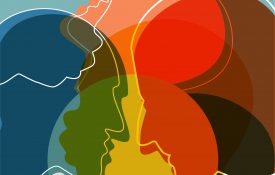-
New Research From Psychological Science
New research published in Psychological Science investigates the ways in which the physical state of our bodies may play a role in shaping what we think, feel, and perceive. Covert Painting Simulations Influence Aesthetic Appreciation of Artworks Helmut Leder, Siegrun Bär, and Sascha Topolinski How does art create aesthetic pleasure? Drawing from existing theory, Helmut Leder of the University of Vienna and his colleagues hypothesized that experiencing a physical resonance with the movements that the artist made when producing the artwork may be one source of aesthetic empathy and, therefore, pleasure.
-
Feeling Disgust May Enhance Our Ability to Detect Impurities
Disgust – it’s an emotion we experience when we encounter things that are dirty, impure, or otherwise contaminated. From an evolutionary standpoint, experiencing the intense, visceral sense of revulsion that comes with disgust presumably helps us to avoid contaminants that can make us sick or even kill us. But new research suggests that disgust not only helps us to avoid impurities, it may also make us better able to see them. If something looks dirty and disgusting, we typically assume it’s contaminated in some way; when something is white, however, we are more likely to assume that it’s clean and pure.
-
Brain Stimulation May Buffer Feelings of Social Pain
Accumulating evidence suggests that certain brain areas involved in processing physical pain may also underlie feelings of social pain. But can altering brain activity in these areas actually change how people experience social pain? Paolo Riva of the University of Milano-Bicocca and colleagues wanted to examine whether there might be a causal relationship between activity in the right ventrolateral prefrontal cortex (rVLPFC) – known to be involved in the regulation of physical pain and negative expressions of emotion – and experiences of social pain. Their findings are published in Psychological Science, a journal of the Association for Psychological Science.
-

Research Explores Markers of Depression From Childhood to Adulthood
A unique longitudinal investigation of Major Depressive Disorder tracks the illness across four critical periods in life, providing new insights into how depression emerges and develops over time.
-
New Research From Psychological Science
Mirta Galesic, Henrik Olsson, and Jörg Rieskamp How accurately do people assess characteristics of the general population? Participants answered questions about 10 characteristics related to their love life, financial situation, friendships, health, work stress, and education. They also estimated the distribution of these qualities in their own social group and in the larger population. Although participants were fairly accurate in judging their social group, their estimates of the population were less accurate. In addition, participants showed specific trait-dependent enhancements or deficits in the reporting of their own characteristics.
-
Post-Divorce Journaling May Hinder Healing for Some
Following a divorce or separation, many people are encouraged by loved ones or health-care professionals to keep journals about their feelings. But for some, writing in-depth about those feelings immediately after a split may do more harm than good, according to new research. In a study of 90 recently divorced or separated individuals, psychological scientist David Sbarra of the University of Arizona and colleagues found that writing about one’s feelings can actually leave some people feeling more emotionally distraught months down the line, particularly those individuals who are prone to seeking a deeper meaning for their failed marriage.

